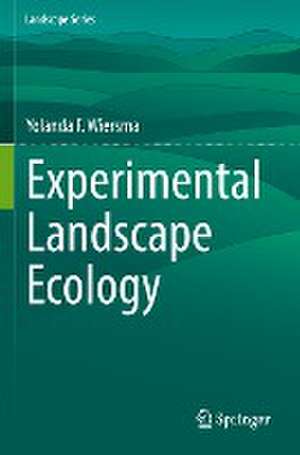Experimental Landscape Ecology: Landscape Series, cartea 29
Autor Yolanda F. Wiersmaen Limba Engleză Paperback – 9 apr 2023
Beginning with an overview of the history and philosophy of the scientific method, and tracing the development of experimental approaches in ecology broadly, the first half of the book discusses the broader issues of what makes a good experiment. Individual chapters describe unique aspects of landscape ecology that present challenges to experimentation, with suggestions for solutions on issues of scale, and how to apply controls, randomization and adequate replication in a landscape setting.
The second half of the book describes different kinds of landscape ecology experimental approaches including:
- large-scale manipulations
- experimental model landscapes
- mesocosms and microcosms
- in silico experiments
- novel landscapes
Together with an annotated resources section, this book aims to stimulate ideas and inspire creativity for graduate students and early career researchers who want to conduct better experiments in landscape ecology.
| Toate formatele și edițiile | Preț | Express |
|---|---|---|
| Paperback (1) | 459.10 lei 38-44 zile | |
| Springer International Publishing – 9 apr 2023 | 459.10 lei 38-44 zile | |
| Hardback (1) | 567.74 lei 3-5 săpt. | +24.10 lei 5-11 zile |
| Springer International Publishing – 8 apr 2022 | 567.74 lei 3-5 săpt. | +24.10 lei 5-11 zile |
Din seria Landscape Series
- 24%
 Preț: 779.54 lei
Preț: 779.54 lei - 18%
 Preț: 1110.72 lei
Preț: 1110.72 lei - 24%
 Preț: 783.08 lei
Preț: 783.08 lei - 24%
 Preț: 670.13 lei
Preț: 670.13 lei - 23%
 Preț: 653.84 lei
Preț: 653.84 lei - 24%
 Preț: 719.88 lei
Preț: 719.88 lei - 20%
 Preț: 554.05 lei
Preț: 554.05 lei - 18%
 Preț: 1005.74 lei
Preț: 1005.74 lei - 18%
 Preț: 1664.61 lei
Preț: 1664.61 lei - 18%
 Preț: 1222.01 lei
Preț: 1222.01 lei -
 Preț: 381.81 lei
Preț: 381.81 lei - 18%
 Preț: 954.31 lei
Preț: 954.31 lei - 18%
 Preț: 1218.69 lei
Preț: 1218.69 lei - 18%
 Preț: 939.00 lei
Preț: 939.00 lei - 18%
 Preț: 940.25 lei
Preț: 940.25 lei - 18%
 Preț: 1565.29 lei
Preț: 1565.29 lei - 15%
 Preț: 641.03 lei
Preț: 641.03 lei - 18%
 Preț: 947.04 lei
Preț: 947.04 lei - 18%
 Preț: 1393.72 lei
Preț: 1393.72 lei - 18%
 Preț: 744.36 lei
Preț: 744.36 lei - 15%
 Preț: 649.22 lei
Preț: 649.22 lei - 24%
 Preț: 688.56 lei
Preț: 688.56 lei - 19%
 Preț: 474.46 lei
Preț: 474.46 lei -
 Preț: 397.01 lei
Preț: 397.01 lei - 15%
 Preț: 636.63 lei
Preț: 636.63 lei - 18%
 Preț: 937.37 lei
Preț: 937.37 lei - 18%
 Preț: 1223.88 lei
Preț: 1223.88 lei
Preț: 459.10 lei
Nou
Puncte Express: 689
Preț estimativ în valută:
87.88€ • 95.49$ • 73.86£
87.88€ • 95.49$ • 73.86£
Carte tipărită la comandă
Livrare economică 17-23 aprilie
Preluare comenzi: 021 569.72.76
Specificații
ISBN-13: 9783030951917
ISBN-10: 303095191X
Pagini: 217
Ilustrații: XVIII, 217 p. 1 illus.
Dimensiuni: 155 x 235 mm
Greutate: 0.44 kg
Ediția:1st ed. 2022
Editura: Springer International Publishing
Colecția Springer
Seria Landscape Series
Locul publicării:Cham, Switzerland
ISBN-10: 303095191X
Pagini: 217
Ilustrații: XVIII, 217 p. 1 illus.
Dimensiuni: 155 x 235 mm
Greutate: 0.44 kg
Ediția:1st ed. 2022
Editura: Springer International Publishing
Colecția Springer
Seria Landscape Series
Locul publicării:Cham, Switzerland
Cuprins
Part I. Introduction.- Part II. Philosophy and Concepts of Experimentation.- Part III. Approaches to Experimentation.- Part IV. Conclusion.- Part V. Resources.
Notă biografică
Yolanda Wiersma is a professor in the Department of Biology at Memorial University of Newfoundland and Labrador. She conducts research in landscape ecology of the Canadian boreal forest.
Textul de pe ultima copertă
This book offers the first guide to landscape ecologists on the art and science of doing experiments, both observational and manipulative. How do you conduct an experiment when your study subject is as big as a landscape? Issues of scale, spatial heterogeneity and limitations on replication may challenge scientists seeking to carry out robust experiments in landscape ecology.
Beginning with an overview of the history and philosophy of the scientific method, and tracing the development of experimental approaches in ecology broadly, the first half of the book discusses the broader issues of what makes a good experiment. Individual chapters describe unique aspects of landscape ecology that present challenges to experimentation, with suggestions for solutions on issues of scale, and how to apply controls, randomization and adequate replication in a landscape setting.
The second half of the book describes different kinds of landscape ecology experimental approaches including
Together with an annotated resources section, this book aims to stimulate ideas and inspire creativity for graduate students and early career researchers who want to conduct better experiments in landscape ecology.
Beginning with an overview of the history and philosophy of the scientific method, and tracing the development of experimental approaches in ecology broadly, the first half of the book discusses the broader issues of what makes a good experiment. Individual chapters describe unique aspects of landscape ecology that present challenges to experimentation, with suggestions for solutions on issues of scale, and how to apply controls, randomization and adequate replication in a landscape setting.
The second half of the book describes different kinds of landscape ecology experimental approaches including
- large-scale manipulations
- experimental model landscapes
- mesocosms and microcosms
- in silico experiments
- novel landscapes
Together with an annotated resources section, this book aims to stimulate ideas and inspire creativity for graduate students and early career researchers who want to conduct better experiments in landscape ecology.
Caracteristici
First book specific to the discipline of Landscape Ecology dealing explicitly with the issue of experimentation Includes annotated 'resources' section, detailing software packages, tools and techniques and further reading Illustrated with examples from different systems around the world
